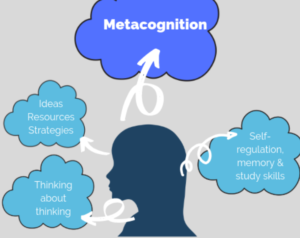

Ever since the Education Endowment Foundation reported that metacognition adds an average of 7 months additional progress and is one of the cheapest strategies based on a strong body of research, many teachers and senior leaders are looking to implement it at their school. But what actually is it? And most importantly, how can we help students develop it?
Metacognition is often defined as ‘thinking about thinking’. However, it is actually much more than that. It covers students’ ability to reflect and critically analyze how they think. Essentially, it is about developing student’s self-awareness, so that they can better monitor, reflect and analyze their own performances. As a result, they become better independent learners.
How Can Schools Develop Student Metacognition?
As metacognition covers a broad range of thinking strategies, there are numerous ways that teachers and schools can help students improve it. We have highlighted four possible ways they can do this.
Before-During-After
Teachers can develop their students’ metacognitive skills by helping them break down the task into three areas; before, during and after. By ensuring that they take time to plan how they are going to do a task, monitor their progress during and evaluate afterwards, their self-awareness, self-reflection and performance next time should all improve. Specifically, this could include:

Model the Correct Thought Processes
If we want to help students identify the correct thinking process, then it may be helpful to model our thought processes. This can be especially helpful for novices at a task, as it provides a step by step guide about how to solve the problem. By breaking it into manageable chunks and actionable steps, the task will seem less daunting and therefore less stressful. Exposing students to their teacher’s thought processes removes any ambiguity and gives them a clear structure from an expert, that they can apply to similar problems.
Use Metacognitive Questioning
Another way in which teachers can enhance their student’s metacognitive skills is by teaching them how to talk to themselves in a helpful and positive way. One seminal study in this area found that by having students ask themselves three simple questions before they started their revision led to them scoring a third of a grade higher. The three questions they had students ask themselves were ‘which resources do I need to help me study?’, ‘why are these resources helpful?’ and ‘how will I use this resource?’ Doing so, improved their self-reflective skills with students reporting they felt more in control of their learning.
Teach Students the Science of Learning
Giving students an awareness of effective strategies that they can use to learn is another way to improve their metacognitive skills. One of the most effective learning strategies is retrieval practice, which requires students to generate an answer to a question. Retrieval practice is effective as it reinforces previous learning which helps create stronger memory traces. This means that actually students shouldn’t do revision in order to do well in a test, but instead do lots of tests to help their revision.
Originally published at: https://www.independentschoolsportal.org
You must be logged in to post a comment.
Are you aware of the problems with the EEF findings on metacognition. See critique in this article https://gregashman.wordpress.com/2019/09/23/mindset-theory-and-metacognition-are-both-false-idols/